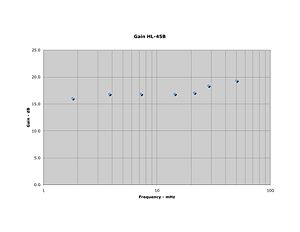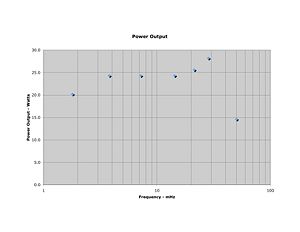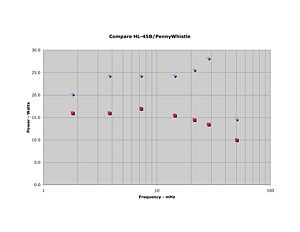Difference between revisions of "The Tokyo Hy-Power HL-45B Solution"
m (cleaned up link to FCC) |
m (Credit to N6AS on charts) |
||
| Line 1: | Line 1: | ||
| − | [[Image:0001ii.jpg|thumb|300px|Figure #1. | + | [[Image:0001ii.jpg|thumb|300px|Figure #1. N6AS measured gain of the HL-45B HF/6 Meter Amplifier]] |
| − | [[Image:0001gz.jpg|thumb|300px|Figure #2. | + | [[Image:0001gz.jpg|thumb|300px|Figure #2. N6AS measured power output of the HL-45B HF/6 Meter Amplifier at 13.8 Volts]] |
| − | [[Image:0001vl.jpg|thumb|300px|Figure #3. | + | [[Image:0001vl.jpg|thumb|300px|Figure #3. N6AS comparison of the HL-45B HF/6 Meter Amplifier power output to the PenneyWhistle power output when both are operated at 13.8 Volts]] |
The HL-45B is a small compact HF and 6 meter amplifier capable of 45 Watts output on all modes. Band switching is manual, but all required low pass filters are included. Because it requires 5 Watts input to drive it to full power, detailed construction notes are provided to provide a small preamp between the Penelope and HL-45B. | The HL-45B is a small compact HF and 6 meter amplifier capable of 45 Watts output on all modes. Band switching is manual, but all required low pass filters are included. Because it requires 5 Watts input to drive it to full power, detailed construction notes are provided to provide a small preamp between the Penelope and HL-45B. | ||
Specifications and other information on the Tokyo Hy-Power labs' HL-45B are available at [http://www.thp.co.jp/english/hl_45b_e.html Tokyo Hy-Power's web site]. Dick Faust, K9IVB, recommended that we use the FCC data on the HL-45B, if you use the links, you will probably need to rename the files to a name ending with ".pdf" and possibly download the Japanese fonts as requested by the Adobe Reader. The files were readable using Acrobat 9 using the view all files selection on my Mac. Here is the link: [https://fjallfoss.fcc.gov/oetcf/eas/reports/ViewExhibitReport.cfm?mode=Exhibits&RequestTimeout=500&calledFromFrame=N&application_id=473548&fcc_id='UB9HL-45B' FCC files on the Tokyo Hy-Power HL-45B]. Dick also mentioned "The schematic shows a 2db pad and the circuit description indicates 3db - might be able to short out and drive directly with Penny". Please let us know if this improves the solution if anyone tries it. Also we are looking for a way to interface PowerSDR with the band changing circuits in the HL-45B. If enough hams are interested, we could put this on our PowerSDR wish list. | Specifications and other information on the Tokyo Hy-Power labs' HL-45B are available at [http://www.thp.co.jp/english/hl_45b_e.html Tokyo Hy-Power's web site]. Dick Faust, K9IVB, recommended that we use the FCC data on the HL-45B, if you use the links, you will probably need to rename the files to a name ending with ".pdf" and possibly download the Japanese fonts as requested by the Adobe Reader. The files were readable using Acrobat 9 using the view all files selection on my Mac. Here is the link: [https://fjallfoss.fcc.gov/oetcf/eas/reports/ViewExhibitReport.cfm?mode=Exhibits&RequestTimeout=500&calledFromFrame=N&application_id=473548&fcc_id='UB9HL-45B' FCC files on the Tokyo Hy-Power HL-45B]. Dick also mentioned "The schematic shows a 2db pad and the circuit description indicates 3db - might be able to short out and drive directly with Penny". Please let us know if this improves the solution if anyone tries it. Also we are looking for a way to interface PowerSDR with the band changing circuits in the HL-45B. If enough hams are interested, we could put this on our PowerSDR wish list. | ||
Revision as of 19:22, 4 October 2009
The HL-45B is a small compact HF and 6 meter amplifier capable of 45 Watts output on all modes. Band switching is manual, but all required low pass filters are included. Because it requires 5 Watts input to drive it to full power, detailed construction notes are provided to provide a small preamp between the Penelope and HL-45B. Specifications and other information on the Tokyo Hy-Power labs' HL-45B are available at Tokyo Hy-Power's web site. Dick Faust, K9IVB, recommended that we use the FCC data on the HL-45B, if you use the links, you will probably need to rename the files to a name ending with ".pdf" and possibly download the Japanese fonts as requested by the Adobe Reader. The files were readable using Acrobat 9 using the view all files selection on my Mac. Here is the link: FCC files on the Tokyo Hy-Power HL-45B. Dick also mentioned "The schematic shows a 2db pad and the circuit description indicates 3db - might be able to short out and drive directly with Penny". Please let us know if this improves the solution if anyone tries it. Also we are looking for a way to interface PowerSDR with the band changing circuits in the HL-45B. If enough hams are interested, we could put this on our PowerSDR wish list.
The measured Gain of this amplifier is shown in Figure #1.
The Direct Connection Option
Phil Crosno, N6AS, did the initial work on the selection of this amplifier to provide additional power output for a HPSDR rig. His power output of a directly connected HL-45B to a Penelope/Mercury based transceiver is shown in Figure #2. Comparison of the HL-45B to the power output of the PenneyWhistle is shown in Figure #3 (using Penelope as the driver at 13.8 Volts in both cases).
The Full Output Option
David Poole, AD9DP, has developed a single transistor interface circuit that goes between the current Penelope/Mercury HPSDR components to drive the HL-45B to full power. Up to 70 watts output is obtained on the HF bands and 20 watts is achieved on 6 meters. Details on construction of this interface will be posted here as soon as testing is complete.


